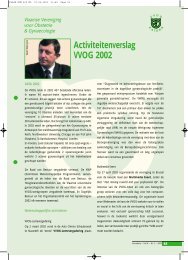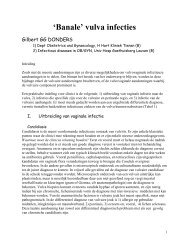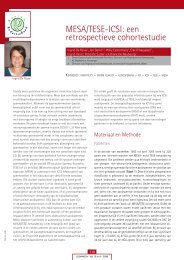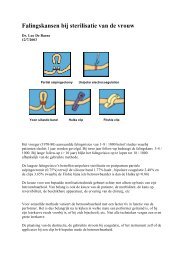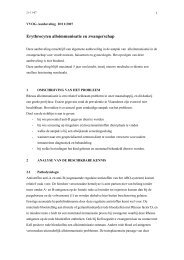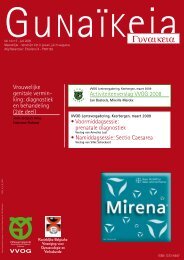Bestand (1.9 MB) - VVOG
Bestand (1.9 MB) - VVOG
Bestand (1.9 MB) - VVOG
Create successful ePaper yourself
Turn your PDF publications into a flip-book with our unique Google optimized e-Paper software.
is als ze berust op multidisciplinaire samenwerking,<br />
waarin vooral de rol van de psycholoog, de diëtist, de<br />
endocrinoloog of de geneticus belangrijk is.<br />
Implicaties van een positieve screening<br />
De patiënt en haar partner moeten worden geïnformeerd<br />
over de implicaties van deze preconceptionele<br />
screening. Die implicaties kunnen onmiddellijk<br />
zijn (onderzoek van de partner), maar ze kunnen ook<br />
optreden in de loop van een toekomstige zwangerschap<br />
(technieken voor prenatale diagnose, zwangerschapsonderbreking).<br />
In tabel 2 worden de handelingen die moeten worden<br />
gesteld, alsook de informatie die moet worden<br />
verstrekt in geval van een positieve screening,<br />
samengevat.<br />
Conclusies<br />
Preconceptionele consultatie dringt zich op als een<br />
essentiële, evidence-based, preventieve geneeskundige<br />
handeling. Een preconceptionele consultatie is<br />
niet beperkt tot een paar bloedonderzoeken; ze omvat<br />
een brede waaier aan activiteiten. Daarom hebben<br />
we voorgesteld om in enkele samenvattende tabellen<br />
een aantal nuttige aanbevelingen te formuleren, die<br />
verstrekkers van gezondheidszorg kunnen helpen in<br />
de dagelijkse praktijk. Deze richtlijnen zullen verschijnen<br />
in het derde artikel van deze reeks gewijd aan<br />
preconceptionele consultatie.<br />
Referenties<br />
1. Tuchmann-Duplessis, Embryologie, 3 Volumes, Masson et Cie Editeurs, Paris, 1997.<br />
2. ONE, Banque de Données Médico-sociales, rapport 2004.<br />
3. Atrash HK. Changing the Prevention Paradigm: The role of Preconception Health and<br />
Health Care in the Prevention of Birth Defects, 1st Central and Eastern European Summit<br />
on Preconception Health and Prevention of Birth Defects, Budapest, Hungary, August<br />
27-30, 2008.<br />
4. Larson WJ. Human Embryology 2nd edition. New York: Churchill Livingston; 1997. Page<br />
xvi.<br />
5. Atrash HK, Johnson K, Adams M, Cordero JF, Howse J. Preconception Care for Improving<br />
Perinatal Outcome: The Time to Act, Matern Child Health J. 10, S3-S11, 2006.<br />
6. Atrash HK, Keith LG Eds. Preconception care: Science, Practice, Challenges and<br />
Opportunities, Maternal and Child Health Journal, Vol. 10, N° 5, 2006 (Numéro spécial).<br />
7. Delvoye P. Le concept de Prévention, in La Santé de la reproduction, Gaston Legrain,<br />
Pierre Delvoye et Justin ranjalahy, FNUAP Eds, 2001.<br />
8. Dunlop A, Jack B, Frey K. National recommendations for Preconception Care: The<br />
essential role of the Family Physician, J. Am Board Fam Med, 20, 81-4, 2007.<br />
9. European Society of Human Genetics, Population genetic screening programmes:<br />
technical, social and ethical issues, European Journal of Human Genetics, 11, Suppl.: 2<br />
55-7, 2003.<br />
10. Douglas Wilson R. The Use of Folic Acid for the Prevention of Neural Tube Defects and<br />
Other Congenital Anomalies, SOGC Clinical Practice guidelines, 138, 2003.<br />
11. Delvoye P. La consultation préconceptionnelle, Education du Patient et Enjeux de Santé,<br />
Vol 23, N° 3, 2005.<br />
GUNAIKEIA ■ VOL 14 Nr 7 ■ 2009<br />
13



